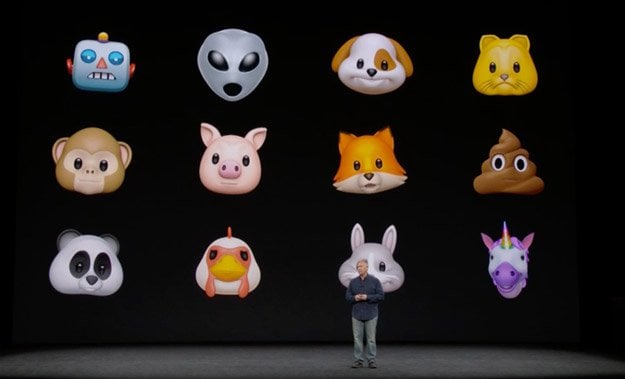Apple Sued For Infringing On Animoji Trademark As An iPhone X Feature
Apple is being sued by an iOS app developer for alleged trademark infringement in connection with the Cupertino company's iPhone X unveiling last month. The developer, a United States citizen who currently resides in Japan claims that Apple willfully and deliberately infringed on his Animoji trademark, which he registered for in August 2014 and was granted in March 2015 by the US Patent and Trademark Office (USPTO).
Developer Enrique Bonansea released the Animoji app through his company Emonster, a software development firm that is based in Tokyo. It is still available on the App Store f or $0.99 under the name "Animoji - Free Animated Texting [Patent Pending]." The app's description says it is a "fast, free and easy-to-use tool to animate your text and email messages." It currently enjoys a 4-star rating, from the seven people who took the time to rate it.

While not exactly popular, Bonansea's lawsuit (PDF) argues that Apple knew about the Animoji app, both because it has been in the App Store for the past three years and, as he alleges, Apple attempted to buy the name from him.
Here is an excerpt from the lawsuit:
Where things get a little murky is when looking at the timing of the trademark. According to the lawsuit, Apple sought to cancel Bonansea's trademark based on his company not existing at the time it was filed. However, Bonansea says that was a technical error on his part, and that he should have filed the trademark under the name of his original company.
Apple's Animoji demonstration was intended to show off the IR camera on the iPhone X and its facial recognition and tracking capabilities. It is a biometric security scheme that is not available on any previous iPhone models, including the iPhone 8 and iPhone 8 Plus.
Bonansea is seeking an injunction preventing Apple from using the Animoji name, and also monetary damages.
Developer Enrique Bonansea released the Animoji app through his company Emonster, a software development firm that is based in Tokyo. It is still available on the App Store f or $0.99 under the name "Animoji - Free Animated Texting [Patent Pending]." The app's description says it is a "fast, free and easy-to-use tool to animate your text and email messages." It currently enjoys a 4-star rating, from the seven people who took the time to rate it.

While not exactly popular, Bonansea's lawsuit (PDF) argues that Apple knew about the Animoji app, both because it has been in the App Store for the past three years and, as he alleges, Apple attempted to buy the name from him.
Here is an excerpt from the lawsuit:
This is a textbook case of willful, deliberate trademark infringement. With full awareness of Plaintiffs’ ANIMOJI mark, Apple decided to take the name and pretend to the world that “Animoji” was original to Apple. Far from it. Apple knew that Plaintiffs have used the ANIMOJI mark to brand a messaging product available for download on Apple’s own App Store. Indeed, Apple offered to buy Plaintiffs’ mark but was rebuffed. Instead of using the creativity on which Apple developed its worldwide reputation, Apple simply plucked the name from a developer on its own App Store. Apple could have changed its desired name prior to its announcement when it realized Plaintiffs already used ANIMOJI for their own product. Yet Apple made the conscious decision to try to pilfer the name for itself — regardless of the consequences.Bonansea claims he was approached by more than one company this past summer about selling his trademark. He believes these companies were fronts were Apple. He further claims that he asked Apple to remove other apps in the App Store that infringed on his Animoji trademark, and that Apple complied with his requests.
Where things get a little murky is when looking at the timing of the trademark. According to the lawsuit, Apple sought to cancel Bonansea's trademark based on his company not existing at the time it was filed. However, Bonansea says that was a technical error on his part, and that he should have filed the trademark under the name of his original company.
Apple's Animoji demonstration was intended to show off the IR camera on the iPhone X and its facial recognition and tracking capabilities. It is a biometric security scheme that is not available on any previous iPhone models, including the iPhone 8 and iPhone 8 Plus.
Bonansea is seeking an injunction preventing Apple from using the Animoji name, and also monetary damages.

